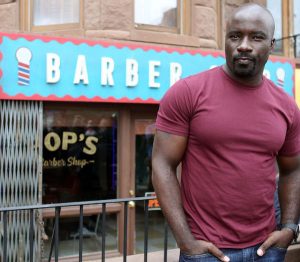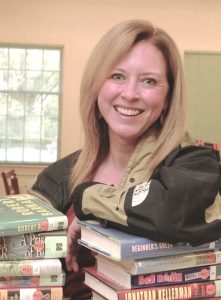 As I launch into my newest book, I am assailed by the usual crucial questions about my protagonist: Is she going to be a writer or an English professor this time? Should I go real wild and make her high school teacher? Educated at the Seven Sisters instead of the Ivy League? Have her take milk in her coffee instead of drinking it black? Maybe she even prefers red wine to white?
As I launch into my newest book, I am assailed by the usual crucial questions about my protagonist: Is she going to be a writer or an English professor this time? Should I go real wild and make her high school teacher? Educated at the Seven Sisters instead of the Ivy League? Have her take milk in her coffee instead of drinking it black? Maybe she even prefers red wine to white?
But wait! Write what you know, right? So, why, even though I am avowed feminist, am I able to write far more interesting, more complex male characters than female ones? Could it be that getting into a male character’s head requires enough of an imaginative leap that I don’t find myself bound by my own preconceptions, whereas I have a lot of trouble writing from the POV of a woman who is substantially different from me — especially when it comes to first person narration? (This is why I’m so completely in awe of Mark Haddon’s accomplishment in The Curious Incident of the Dog in the Night. But more on that in a later post.) In this post I want to consider how making a self-conscious commitment to diversity in my novels also helped me expand my imagination.
I first grew interested in the topic of diversity simply because I was a college instructor trying to develop a balanced syllabus in a course on mystery fiction, but I rapidly grew interested in how diverse viewpoints could offer a post-modernist commentary on classic Golden Age texts. (Much more on that in a later post as well.) Eventually, my teacher self noodged my writer self, and I made a self-conscious decision to ask myself when approaching any given character whether s/he must share my “skin color/social class/gender/sexual ID/religion/ability/region/block association” (in Richie Narvaez’ far more articulate locution than my own).
Sometimes the only answer is yes — especially if you’re writing about a closed society, such as those that characterizes Golden Age fiction. And that’s perfectly fine. (Again, much more on this in a later post.) But making a self-conscious effort to open my fiction to diverse viewpoints opened up my imagination as well as my fiction. My researches on my current historical WIP led me to discover the fascinating history of 19th-century black jockeys, many of whom were former slaves, and were, according to Ed Hotaling, America’s first sports first superstars, despite often being only known by names such as One-Eyed Sewell. At the same time, what was meant to be a minor, throwaway character destined for a comic bromance in my urban fantasy WIP fell in love with his buddy when my back was turned, and the two of them walked off with the entire book.
So is this cultural appropriation, merely to serve my own needs? I don’t know, and I honestly prefer to leave that question to the political arena. When it comes to incorporating diversity into my novels, I am much more concerned about having a leaden ear for people and cultures other than my own. Deeply as I admire — and have successfully taught — Marvel’s Luke Cage, I am well aware I could never recreate the Harlem milieu in the wonderful detail it does. But historical and fantasy novels do not depend on a similar authenticity of lived experience. As Octavia Butler so brilliantly demonstrated in Kindred, African-Americans are in many ways as much bound by their own preconceptions when attempting to understand the lives of slaves as anyone else. As for serving my own needs – well, I’ll plead guilty. It’s a simple enough question to ask yourself: Do these characters need to be exactly like me? But, at least in my experience, it has opened up complex vistas in my work I couldn’t have possibly expected.
 —Erica Obey
—Erica Obey
Erica Obey is the author of, most recently, The Lazarus Vector and The Curse of the Braddock Brides.

I’m glad you’ve written about this. It’s a sensitive subject. It’s important for writers to have a varied cast of characters, for realism and for richness in the storytelling. I think cultural appropriation is problematic when you take something or someone from a culture that may not be your own and cheapen or caricaturize it. Cultural appropriation often gets confused with cultural diffusion, which is the spreading and sharing of culture and which is a valuable and essential part of our life on the planet. Look, let’s face it, we’re all serving our own needs when we write. But being aware of what you’re doing when you make a character someone outside your own culture (and not a writer or an English professor) is a great first step. Being respectful is the next.
Excellent distinction between cultural appropriation and cultural diffusion, Richie! And you’re quite right that it all comes down to respect. I remember being taught as a child that a lack of respect for others is the surest sign you don’t respect yourself. Sometimes it seems like all those lessons you learned in kindergarten were the only ones you really needed.
Look at Tony Hillerman (who is not Navajo) and his books about Navajo police officers, and Alexander McCall Smith (white African man) and his The No. 1 Ladies’ Detective Agency (about a black African woman). Both these authors have been called out for writing outside who they are. They both seem very respectful, but I have to say, and I don’t know if I’m being oversensitive or not, it still feels uncomfortable. Yes, a writer has an imagination and can imagine a different POV, but with people who are marginalized, there’s got to be a whole lot of experience that would be difficult (though not impossible) for a nonmarginalized writer to imagine and get right.
I wonder if your discomfort stems more from the fact that Hillerman and Smith are writing from completely within the POV of marginalized characters, rather than the fact that they seek to write about marginalized characters and societies. In Kindred, which Octavia Butler wrote (partially) in response to a Black Panther’s bewilderment at why the slaves did not rebel, she emphasizes Dana’s status as an outsider, being both from the future and married to a white man. And while Dana does come to understand and respect the slave community, it is her confidence in the superiority of her modern views that get her into trouble over and over again.
When it’s a side character or an outside look at a culture, it feels all right for an author to use her imagination, IMO. But when an author tries to inhabit a whole culture and dozens of characters, it feels off, and feels unfair when the author is part of the power elite and the culture he writes about is not.